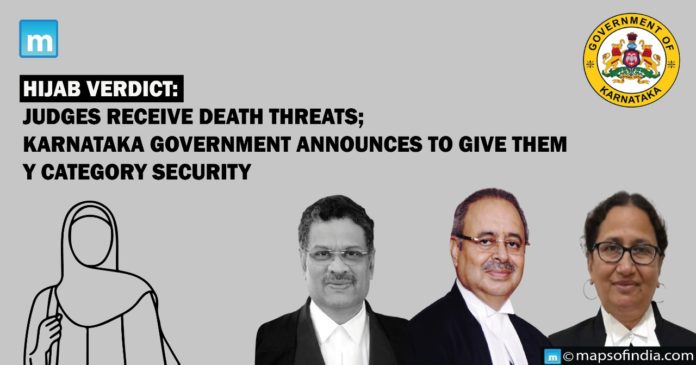The Hijab row in Karnataka was brought to the national limelight as protests started outside many educational institutes across the state. The protestors included Muslim students and their parents, who accused the educational institutions of discriminating among students due to their school dress.
However, many outfits from the community are not satisfied with the verdict and have allegedly given death threats against the three presiding high court judges. The police were quick to take action and have arrested several individuals from Tamil Nadu and Karnataka. The security arrangement of the judges was tightened, and the Karnataka government provided them Y category security.
What is the Hijab Row?
This issue began at the start of this year in Udupi, Karnataka. Starting from a Government PU College where a few girl students alleged that they were not allowed to enter their respective classrooms as they were wearing Hijab. Soon, the guardians of the girls joined them, and the protests started spreading to other parts of the state.
Political parties made it worse
Soon, political parties discovered an opportunity to polarize and started instigating students to wear saffron and hijabs, which led to another confrontation among political groups threatening public safety. Soon the Chief Minister ordered the closure of educational institutions for three days trying to control the tension.
What do the state guidelines say?
Karnataka believes that Hijab is not an essential practice in the religion, and thus it should not be made into a more significant issue. Also, the government claims that educational institutions can impose their dress code prohibiting religious attire from ensuring secular education.
What does the court say?
Students knocked on the door of the courts as they accused the authorities of violating their fundamental rights under article 14 of the Indian constitution, which states, “Equality before law The State shall not deny to any person equality before the law or the equal protection of the laws within the territory of India Prohibition of discrimination on the grounds of religion, race, caste, sex or place of birth.”
Article 19 states all citizens shall have the right to freedom of speech and expression. Also, article 25 says, “Freedom of conscience and free profession, practice and propagation of religion.”
However, On March 15, 2022, the high court finally put an end to this matter with its verdict, which declared the Hijab to be a non-essential part of Islam.
According to the judgment, these are the points that need to be considered to call any religious activity essential:
(i) “Not every activity associated with the
religion is essential to such a religion. Practice should be
fundamental to religion, and it should be from the time
immemorial”
(ii) “Foundation of the practice must precede the
religion itself or should be co-founded at the origin of the
religion”
(iii) “Such practice must form the cornerstone of religion
itself. If that practice is not observed or followed, it would result in the change of religion itself and,
(iv) Such practice must be of binding nature to the religion itself and compelling”.










